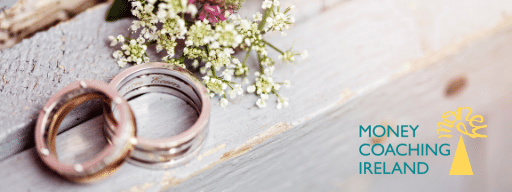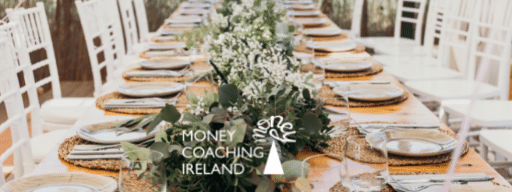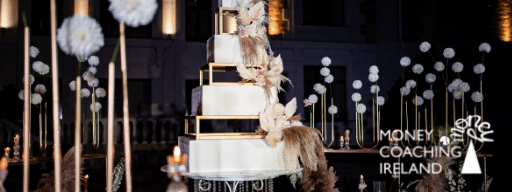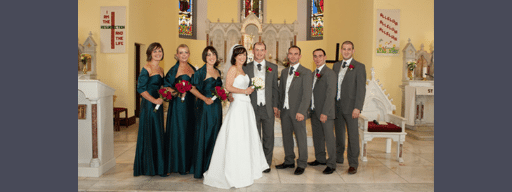To have and to hold
May 14 2021
Do your best to ensure it's death and not debt that does you part by considering how you can have your big day without breaking the bank. Reading time 3 minutes.

As a money coach and financial educator, how to manage the cost of a wedding is something I occasionally get asked about. With 80% of adults in Ireland expected to be vaccinated by the end of June, the prospect of an easing of restrictions on wedding guest numbers will soon become a reality.
With that in mind, the celebration of my own 10th wedding anniversary today and having recently watched the final ever episode of Schitt’s Creek (amazing by the way 😍), I thought it was a good time to set out some food for thought on this very personal matter.

First and foremost, as with any big expense, it is a good idea to budget how much you are willing to spend and to save as much as possible towards the cost. This is likely to involve open communication, compromise and working together with your partner to make it all happen as smoothly as possible - a good exercise for what will be required of you in marriage.
Starting out your married life saddled with unwanted personal debt because one of you decided to go overboard on the big day will soon take the gloss off that over-the-top wedding cake. Even if it did come complete with over 900 floral accents - a fruit cake is a fruit cake at the end of the day!

I’m not saying that you don’t deserve the wedding of your dreams but putting yourself in debt that you’ll find difficult to repay or having to postpone a dream of owning your own home for the sake of the material aspects of one day, may not be worth it, particularly, if it’s only one of you that’s ‘wedded’ to those aspects.
It can be easy to get carried away and forget about what’s really important. That is you and your partner declaring your love and making a formal commitment to each other in front of your nearest and dearest.
You don’t need an outrageously priced dress or the most expensive rings to do that and even if you have those things, they’re not what create a fun and memorable day for you, your family or your friends.

And that brings us to the question of guests, which is more financially savvy - a big wedding or a small wedding? As a management accountant (and a true romantic 💏), I have to say that it all depends on the breakdown of your fixed and variable costs.
If you’re not from a management accounting background, your fixed costs are those that tend not to increase the more guests you have - things like the rings, the flowers, the celebrant, the photographer, the videographer, the dresses, the suits, hair and make-up and the cake (floral accented or not).
Your variable costs are the per head costs - things like the food, the drinks, stationery, seat covers and favours. If you don’t know anything about those last two items - best to keep it that way - nobody will miss them or be any the wiser.
If a small wedding influences your fixed costs downwards, then it may be sensible to proceed now before the covid restrictions are lifted 😉 In general, however, particularly if you want the bells and whistles, these costs are likely to be the same whether you are having 50 people or 200 people at your wedding.
So that leaves your variable costs and not to be too mercenary about it but the monetary value of gifts you are likely to receive. When you consider the ‘contribution’ to your fixed costs that each guest is likely to make, the economics of a small wedding may not stack up.
In fact, a fellow management accountant Victor Sheahan, having applied costing theory to his own wedding, concluded that 193 was the optimum number of guests. The article where he describes this budgeting exercise appeared in FM Magazine in 2006 and is one that I never forgot. Five years later, the fact that there were 173 guests at my wedding and 20 declines is purely coincidental I assure you 😉

In all seriousness, your big day is unique to you and your partner so it is entirely up to you what it looks like, how much you spend and how you fund it. My only intention is that my words have given you some food for thought on how to make it special without breaking the bank.
A final word of advice is that on the day, you can be sure that not everything will go according to your best laid plans so it’s best if you can just roll with it - another good life lesson 💡
And if you’re wondering how much I paid for my wedding dress, I am very proud to say that I purchased it in Barnardos at a very reasonable price and it subsequently went back to the cycle.
All the men’s suits were rented so I think we did our bit for the circular economy. Well, maybe not with my Jimmy Choos but hey, we all have our weaknesses. It is once in a lifetime after all and yes, I still have them!
Important Information about Money Coaching Ireland’s BLOG
The material contained in these blog posts is intended for educational and entertainment purposes only. No responsibility is taken by Money Coaching Ireland for actions taken or not taken by individuals as a result of reading/watching/listening to these posts. Money Coaching Ireland recommends that individuals seek professional advice prior to making any significant financial decisions.
Subscribe to our mailing list
We would love to keep in touch by sending quarterly newsletters, monthly money tips and occasional updates about promotions and events we may be running. We will never sell or lease your details and you may unsubscribe at any time. You can find out about how we store and protect your information in our Privacy Policy.
By signing-up to receive updates you agree with the storage and handling of your data by Money Coaching Ireland and its trusted service providers. Read our Privacy Policy.